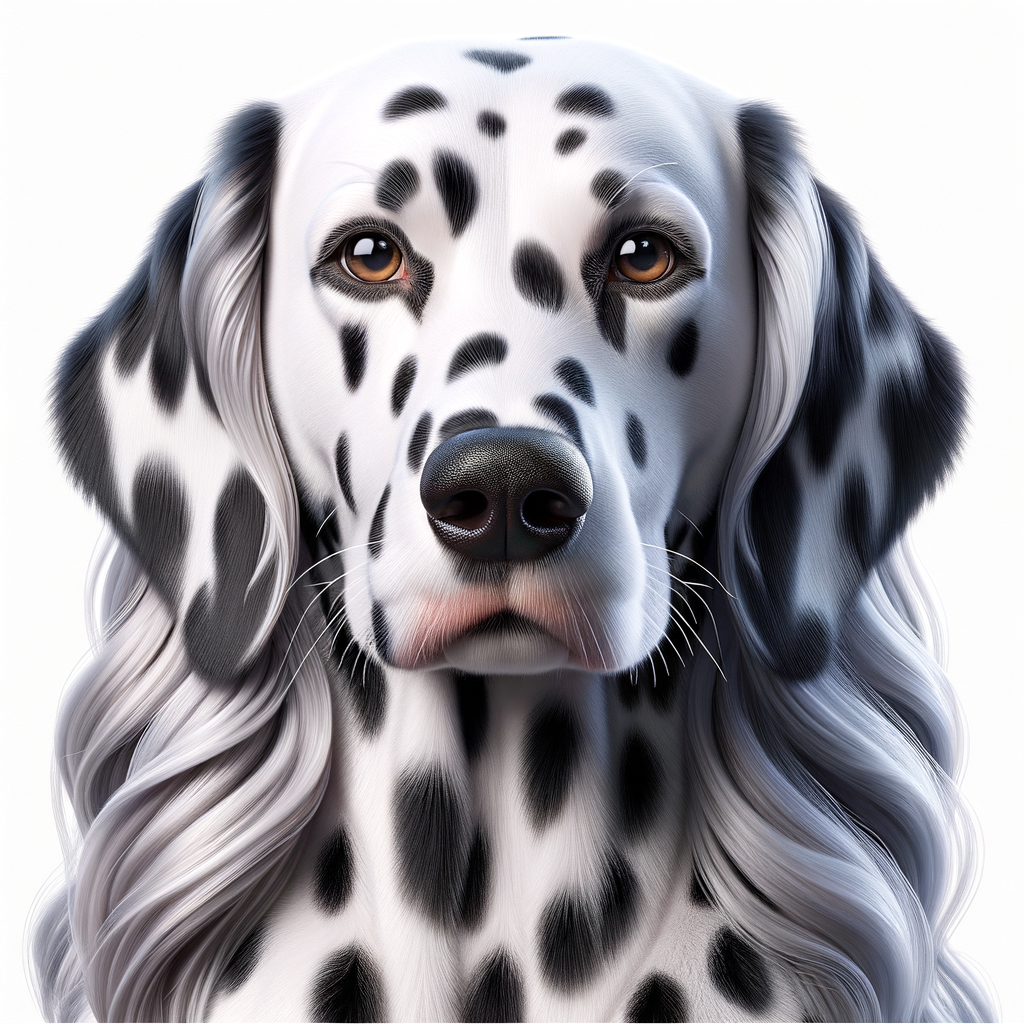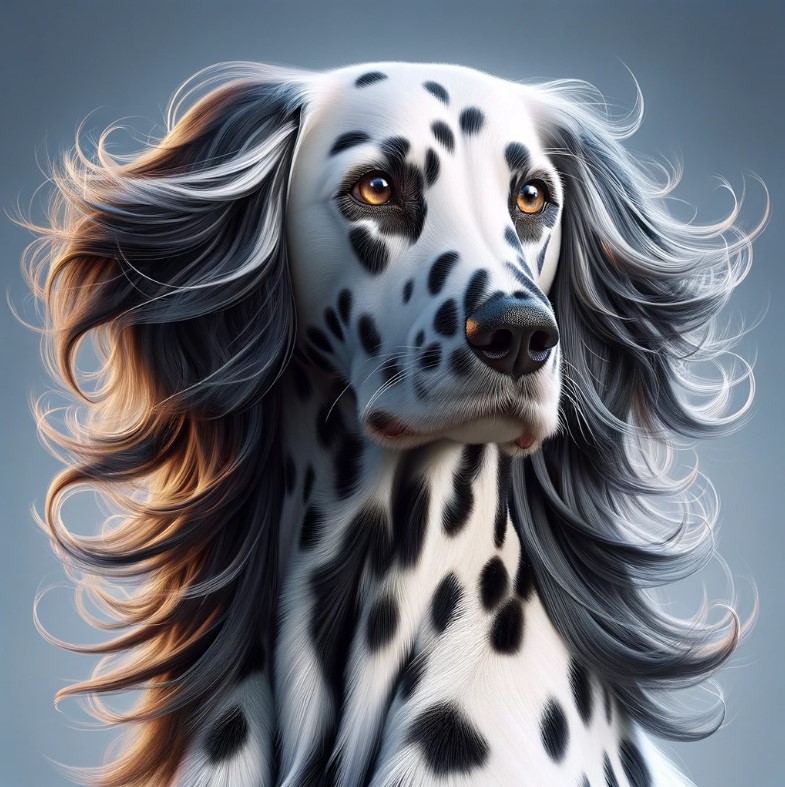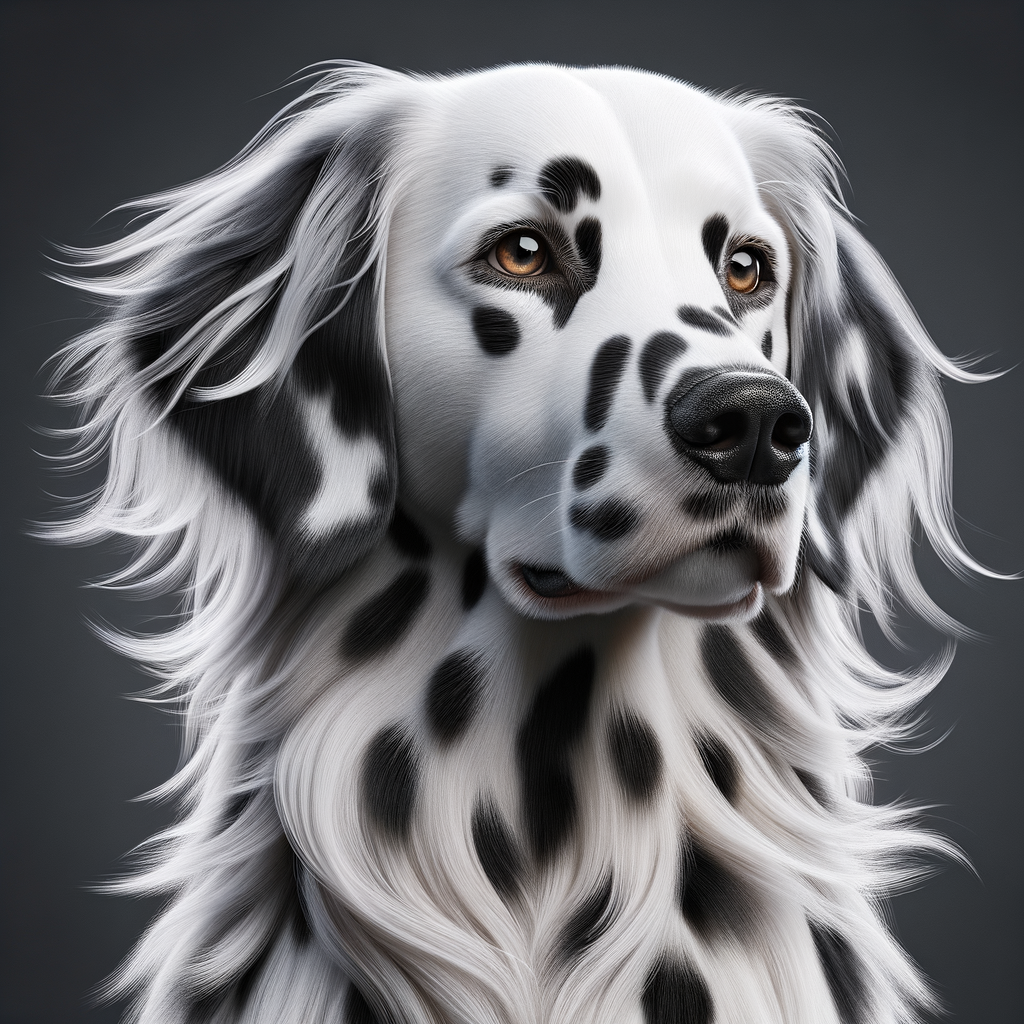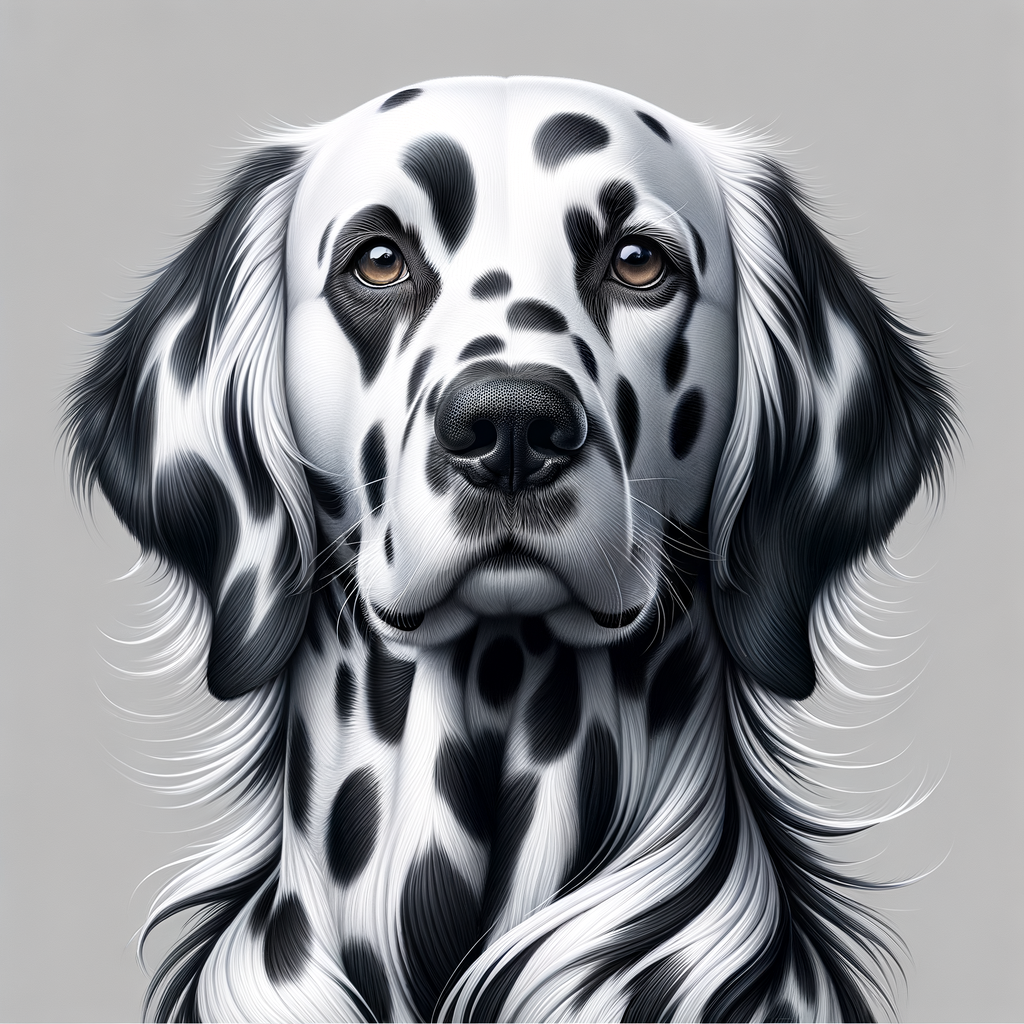Hi there, I’m a holistic veterinarian with a keen interest in unique dog breeds. In this article, we’ll delve into the world of the Longhaired Dalmatian, a twist on the traditional spots we all love. We’ll explore everything from their charming appearance, temperament, health, and grooming needs, to tips on training, nutrition, and where you can find one of these beautiful pooches to call your own. So, let’s get started on this exciting journey!

Unleashing the Dynamic Personality of Longhaired Dalmatians
Have you ever wondered about the temperament of the beautifully spotted longhaired Dalmatian? Let’s dive into the fascinating world of this unique breed and discover why they could be the perfect fit for your family.
Are Longhaired Dalmatians Family & Kid Friendly?
Longhaired Dalmatians, like their short-haired counterparts, are known for their friendly and outgoing nature. They thrive when they’re part of a family and are generally good with children. These dogs are sociable, playful, and love to be the center of attention. It’s important to remember, however, that children should always be supervised when interacting with any dog. Despite their good nature, Dalmatians are a larger breed and could unintentionally knock over a smaller child during play.
One of the great things about these dogs is their versatility. They can adapt to many different types of homes and families, from those living in apartments to those with large backyards. However, they do need plenty of exercise and mental stimulation to stay happy and healthy. This makes them a great match for active families who love to get out and about.
Energy Level Of Longhaired Dalmatians
Longhaired Dalmatians are energetic dogs with a lot of stamina. They were originally bred to run alongside carriages, so they have a natural love of exercise and activity. This means that they require a lot of physical stimulation and exercise to prevent them from becoming bored and potentially destructive.
Typically, a longhaired Dalmatian needs at least one hour of exercise per day, but more is always better. This can be divided into walks, playtime, and other activities like agility or obedience training. They also love to play fetch and can make excellent jogging companions. If you’re an active person who loves to spend time outdoors, a longhaired Dalmatian could be the perfect dog for you.
One thing to keep in mind is that these dogs can be a bit stubborn at times. They’re intelligent and can sometimes try to outsmart their owners. This means that consistent, positive reinforcement training from a young age is crucial. However, their love of people and desire to please makes them generally good learners.
Remember, every longhaired Dalmatian is unique and may not fit these typical breed characteristics. When considering adding one of these dogs to your family, it’s always a good idea to spend some time with the dog first to make sure you’re a good match for each other.
Average Lifespan Of Longhaired Dalmatians
The longhaired Dalmatian is a rare variation of the traditional Dalmatian breed. They are known for their unique coat and distinctive spots, but one question that comes to the minds of potential dog parents is, “How long do these adorable creatures live?”
How Diet Affects Lifespan
The average lifespan of a longhaired Dalmatian is between 10 to 15 years. However, this range can vary depending on various factors, one of which is diet. Nutrition plays a vital role in your dog’s health and longevity.
Providing your longhaired Dalmatian with a balanced diet rich in high-quality proteins, healthy fats, and a variety of fruits and vegetables can significantly contribute to their overall well-being and longevity. It’s also crucial to avoid feeding them food with artificial additives or low-quality ingredients, as these can lead to obesity, digestive issues, and other health problems that can shorten their lifespan.

The Holistic Vet’s Perspective of How Spay & Neuter Timing Affects Lifespan
Another factor that can influence the lifespan of your longhaired Dalmatian is the timing of spay and neuter procedures. Traditionally, these procedures are recommended for young puppies to prevent unwanted litters and certain health issues. However, emerging studies suggest that early spay and neuter might not be the best approach.
From a holistic veterinary perspective, early spay and neuter can potentially disrupt normal growth and development, leading to joint and bone deformities. It can also potentially alter hormonal balance, increasing the risk of chronic diseases like thyroid problems and Cushing’s disease. Furthermore, there’s a growing body of evidence suggesting that early spay and neuter might increase the risk of certain types of cancer.
While these findings do not suggest that you should avoid spaying or neutering your longhaired Dalmatian altogether, they do imply that it might be better to wait until your dog is fully grown before considering these procedures. This approach can help ensure that your dog develops properly and might reduce their risk of health issues later in life, potentially extending their lifespan.
In conclusion, while the average lifespan of longhaired Dalmatians is 10 to 15 years, various factors can influence this. By providing a nutritious diet and considering the timing of spay and neuter procedures, you can help ensure that your longhaired Dalmatian lives a long, healthy, and happy life.
Should You Rescue Or Purchase Longhaired Dalmatians?
When it comes to acquiring a longhaired Dalmatian, you have two primary options: rescuing or purchasing. Both options have their own unique advantages and it’s important to consider what works best for you and your family.
Benefits of Rescuing or Adopting
Rescuing or adopting a longhaired Dalmatian can be a rewarding experience. Here are some reasons why you might consider this option:
- Give a Second Chance: By adopting a dog, you’re giving them a second chance at life. Many dogs in shelters have been abandoned or mistreated, and they deserve a loving home.
- Cost: Adoption fees are generally lower than the cost of buying a puppy from a breeder. This makes it a more affordable option for many families.
- Support Shelters: Your adoption fee goes towards supporting the shelter and helping other animals in need.
- Age Variety: Shelters have dogs of all ages. If you’re not prepared for the high energy and intensive training a puppy requires, you might find an older, more relaxed longhaired Dalmatian a better fit.
Benefits of Buying
On the other hand, buying a longhaired Dalmatian from a reputable breeder also has its merits:
- Health Background: Reputable breeders usually provide detailed health histories of the pup’s parents, which can give you an idea of potential future health issues.
- Early Socialization: Breeders often begin socializing puppies at a very young age, which can lead to better behavior and easier training.
- Breed Knowledge: Breeders have a wealth of knowledge about the breed and can provide you with tips and advice on care, training, and health.
- Predictability: When you buy a puppy, you have more control over their early experiences and environment, which can influence their future behavior and health.
Whether you choose to rescue or purchase a longhaired Dalmatian, the most important thing is that you’re prepared to provide a loving, caring home for your new furry friend. Both rescuing and purchasing have their own unique benefits, and either option could be the perfect way for you to bring a longhaired Dalmatian into your life.

Average Cost For Longhaired Dalmatians
When considering bringing a longhaired Dalmatian into your home, it’s crucial to understand the financial commitment involved. This breed is a bit rarer than its short-haired counterpart, which can impact the cost.
Average Cost
On average, you can expect to pay anywhere from $600 to $1,500 for a longhaired Dalmatian puppy. The price can vary significantly depending on several factors, including the breeder’s reputation, the puppy’s lineage, and the demand for this specific breed.
Keep in mind that this initial cost only covers the purchase of your new pet. There are additional expenses to consider, such as vaccinations, spaying or neutering, and microchipping, which can add several hundred dollars to the initial cost. Plus, don’t forget the ongoing expenses such as food, grooming, regular vet check-ups, and pet insurance if you choose to have it.
What To Look For In A Breeder
While cost is a significant factor, it should not be the only consideration when choosing a breeder. It’s essential to find a reputable breeder who prioritizes the health and well-being of their dogs over making a profit.
A good breeder should be able to provide you with health clearances for both of the puppy’s parents, proving that they have been tested for common conditions that affect Dalmatians. They should also be open and transparent about the puppy’s medical history and the conditions in which the puppies are raised.
Here are some key points to consider when choosing a breeder:
- Reputation: Look for reviews or ask for references from previous customers.
- Knowledge: A reputable breeder should be able to answer all your questions about longhaired Dalmatians and provide guidance on their care.
- Health Guarantee: A good breeder should offer a health guarantee for their puppies.
- After-sale Support: A responsible breeder will be available for you to contact if you have any questions or concerns after bringing your puppy home.
Remember, a good breeder will also ask you questions to ensure that their puppies are going to a good home. They’ll want to know about your lifestyle, home environment, and your knowledge about the breed.
In conclusion, while the cost of a longhaired Dalmatian can be quite high, the joy and companionship they bring are priceless. Just ensure that you’re prepared for the financial commitment and that you choose a breeder who has the puppies’ best interests at heart.
Training & Behavior of Longhaired Dalmatians
When it comes to longhaired Dalmatians, training and behavior are key aspects to consider as a dog parent. These dogs are known for their intelligence and eagerness to please, which can make them a joy to train. However, they also have a stubborn streak, so consistency and patience are essential.
Overall Trainability of Longhaired Dalmatians
Longhaired Dalmatians are generally quite trainable, thanks to their intelligent and eager-to-please nature. Like with any dog breed, early socialization and puppy training classes are recommended. Positive reinforcement methods work best with this breed. They respond well to treats, praise, and playtime as rewards for good behavior.
Training should be consistent and firm, but never harsh or aggressive. Dalmatians are sensitive dogs and harsh methods can lead to behavioral issues. It’s also important to keep training sessions short and fun to prevent boredom – remember, a bored Dalmatian can become a destructive Dalmatian!
Why Crate Training Is Recommended
Crate training is recommended for longhaired Dalmatians for several reasons. Firstly, it provides a safe and secure space for your dog. Dalmatians can sometimes be a little anxious, and having a “den” to retreat to can help them feel more secure.
Secondly, crate training can be a useful tool in housebreaking. Dogs naturally avoid soiling their sleeping areas, so a crate can encourage good bathroom habits.
And finally, a crate can be a safe place to keep your Dalmatian when you’re not home to supervise them. This can help prevent destructive behaviors and ensure your dog’s safety.
Potential Negative Behaviors To Watch For With Longhaired Dalmatians
Despite their generally good-natured temperament, there are a few potential negative behaviors to watch out for with longhaired Dalmatians.
- Stubbornness: Dalmatians are known for their stubborn streak. This can sometimes make training a challenge. As mentioned earlier, consistency and patience are key when training a Dalmatian.
- Destructive behaviors: If a Dalmatian gets bored or doesn’t get enough exercise, they may resort to destructive behaviors like chewing or digging. This is another reason why crate training and regular exercise are important.
- Separation anxiety: Dalmatians are very social dogs and can suffer from separation anxiety if left alone for long periods. If you’re often away from home, a Dalmatian may not be the right breed for you.
In conclusion, while longhaired Dalmatians have a few potential behavior issues, with the right training and care, they can make wonderful, well-behaved pets.

Grooming Requirements For Longhaired Dalmatians
If you’re considering a longhaired Dalmatian, it’s essential to understand their grooming needs. These beautiful dogs require certain care to keep their coat healthy and shiny.
What About Shedding?
Longhaired Dalmatians do shed, but not as much as their short-haired counterparts. Their hair is longer and silkier, so it doesn’t fall out as quickly. However, they still shed year-round, with two significant shedding periods, usually in the spring and fall.
During these times, it’s important to groom your Dalmatian regularly to prevent their hair from matting and to keep shedding under control. Brushing your Dalmatian at least once a week can help remove loose hair and prevent it from spreading all over your house. A slicker brush or a de-shedding tool can work wonders in managing the shedding.
Excessive Shedding May Be Due To Nutrition
If you notice your Dalmatian shedding excessively, it could be due to their diet. Nutrition plays a crucial role in the health of a dog’s coat. A diet lacking in essential nutrients can lead to dry, brittle hair that breaks and falls out more easily.
If your longhaired Dalmatian is shedding more than usual, it might be worth reviewing their diet. Are they getting enough high-quality protein? Are you providing them with a balanced diet that includes all the necessary vitamins and minerals for healthy hair growth? These are critical considerations.
It’s also worth considering supplements that can boost your dog’s coat health. Omega-3 and Omega-6 fatty acids, for example, have been proven to promote healthy skin and a shiny coat.
Remember, a healthy diet not only keeps your Dalmatian’s coat looking great but also contributes to their overall well-being. But don’t worry, we’ll delve deeper into the role of nutrition and health in the next part of this series on the longhaired Dalmatian.
In addition to diet, other factors such as stress, parasites, and underlying health issues can cause excessive shedding. If you’re concerned about your dog’s shedding, it’s always best to consult with your vet.
Grooming a longhaired Dalmatian is not a huge undertaking, but it does require regular attention. With routine care, your Dalmatian’s coat will stay healthy, beautiful, and spot-tacular! Remember, proper grooming is not only about maintaining the appearance of your Dalmatian but also a vital part of their overall health and happiness.
Overall Health of Longhaired Dalmatians
As a dog parent, it’s important to know that Longhaired Dalmatians are generally a robust and healthy breed. However, like all dog breeds, they are susceptible to certain health conditions. It’s not a guarantee that your Longhaired Dalmatian will suffer from any of these health problems, but it’s crucial to be aware of them when considering this breed.
Longhaired Dalmatians are active dogs, and they typically enjoy good health throughout their lives. However, due to their specific gene pool, they are prone to certain genetic conditions. Regular vet check-ups and a balanced diet will help keep your Dalmatian happy and healthy.
Potential Health Conditions
- Deafness: Dalmatians, in general, are prone to deafness. According to the Dalmatian Club of America, approximately 8% of Dalmatians are born deaf in both ears, and 22-24% are deaf in one ear. It’s essential to have your Dalmatian puppy tested for deafness at a young age.
- Urinary Stones: Dalmatians have a unique urinary system that can lead to the formation of urinary stones. This can be managed with a special diet and plenty of fresh water.
- Skin Allergies: Like many breeds, Longhaired Dalmatians can suffer from skin allergies. Regular grooming and vet-approved shampoos can help manage this condition.
- Hip Dysplasia: While not as common as in other breeds, hip dysplasia can occur in Dalmatians. This condition can be managed with weight control, exercise, and in severe cases, surgery.
Longhaired Dalmatians also require regular eye check-ups as they can sometimes suffer from eye conditions like entropion or cataracts. Regular exercise and mental stimulation are also vital for this active and intelligent breed’s overall health.
Remember, every dog is unique, and these potential health issues do not mean that every Longhaired Dalmatian will experience them. Your vet can provide you with more information and guide you on how to ensure the best health care for your furry friend.
Conclusion
As you can see, while Longhaired Dalmatians are generally healthy dogs, they do have some breed-specific health considerations. However, with regular veterinary care, a balanced diet, and plenty of exercise, these dogs can lead happy, healthy lives.
As a potential Longhaired Dalmatian parent, it’s important to understand the breed’s health requirements so you can provide the best care possible. After all, our goal is to ensure that our furry friends live long, fulfilling lives, full of fun and frolic.
By being informed and proactive, you can ensure that your Longhaired Dalmatian remains a healthy, joyful companion for years to come. Whether you’re playing fetch in the park, going for a walk, or simply enjoying a peaceful evening at home, the time spent with your Longhaired Dalmatian will be filled with unforgettable moments of joy and companionship.
Longhaired Dalmatian Nutrition & Diet
My Best Nutrition Tips (From Dr. Candy)
As a dog parent, it’s essential to understand that the health of your longhaired Dalmatian largely depends on their diet. Here are a few nutrition tips to ensure your pet stays healthy and vibrant:
- Quality Matters: Always opt for high-quality commercial dog food. Be sure to check the first few ingredients – they should be whole meats and vegetables, not by-products or fillers.
- Protein is Key: Longhaired Dalmatians need a diet rich in protein to maintain their muscle mass and overall health. Look for foods with real meat as the first ingredient.
- Limited Grains: Dalmatians tend to have sensitive stomachs, so a grain-free diet might be beneficial to prevent digestive issues.
- Fruits and Vegetables: Incorporating fruits and vegetables into their diet provides essential vitamins and minerals. However, be aware of toxic foods such as grapes, onions, and chocolate.
- Portion Control: Overeating can lead to obesity, which puts your longhaired Dalmatian at risk for various health issues. Feed them according to their age, size, and activity level.
Best Holistic Foods For Longhaired Dalmatians
Holistic foods can provide more natural, nutrient-rich options for your longhaired Dalmatian’s diet. Here are some top recommendations:
- Blue Buffalo Wilderness High Protein Grain-Free: Rich in real chicken and sweet potatoes, this recipe is grain-free and designed to meet the nutritional needs of active dogs.
- Orijen Original Dry Dog Food: Made with fresh, free-run chicken and turkey, wild-caught fish, and cage-free eggs, this biologically appropriate recipe offers a diverse range of proteins.
- Wellness CORE Grain-Free Original: This high-protein, grain-free recipe contains premium, all-natural ingredients with no wheat, corn, soy, or artificial colors, flavors, or preservatives.
As a dog parent, it’s crucial to remember that every longhaired Dalmatian is unique and might have individual dietary needs. Always consult with your vet before making significant changes to their diet.
Remember, a balanced diet is not just about the right food but also about proper feeding habits. Regular meals, portion control, and limiting treats can go a long way in keeping your longhaired Dalmatian healthy.
Nutrition is a key aspect of your pet’s overall wellness strategy. By providing high-quality, well-balanced meals, you’re not just feeding your longhaired Dalmatian – you’re nurturing their health, vitality, and quality of life. And isn’t that what being a loving dog parent is all about?
Frequently Asked Questions
What is a Longhaired Dalmatian?
A Longhaired Dalmatian is a variation of the traditional Dalmatian breed, known for its longer coat. While they possess the same iconic spots, their hair is longer and often appears wavy or curly.
Is the care for a Longhaired Dalmatian different from a traditional Dalmatian?
Yes, Longhaired Dalmatians require more grooming due to their longer coats. They need regular brushing to prevent matting and tangles, but they share the same general health and exercise needs as traditional Dalmatians.
Are Longhaired Dalmatians more prone to any specific health issues?
Longhaired Dalmatians share the same health concerns as their short-haired counterparts, including deafness and urinary stones. However, their longer coats do not contribute to any additional health issues.
Are Longhaired Dalmatians recognized by major kennel clubs?
Currently, Longhaired Dalmatians are not recognized as a separate breed by major kennel clubs. They are considered a variation of the traditional Dalmatian breed.
What is the temperament of a Longhaired Dalmatian?
Longhaired Dalmatians have a similar temperament to traditional Dalmatians. They are known for their high energy levels, intelligence, and friendly nature. They make excellent family pets and get along well with children and other animals.
Dr. Candy, a holistic veterinarian and certified raw dog food nutrition specialist, graduated from Oklahoma State University in 2009 with a DVM and has since specialized in companion animal nutrition, advocating for species-specific diets. With a background in wildlife rehabilitation and oil spill response, she combines holistic health and conventional medicine in her unique approach to treating chronic diseases, allergies, and autoimmune conditions in pets. As the owner of a veterinary practice in Colorado and an author, Dr. Candy is dedicated to educating pet parents and improving the health and happiness of animals.




